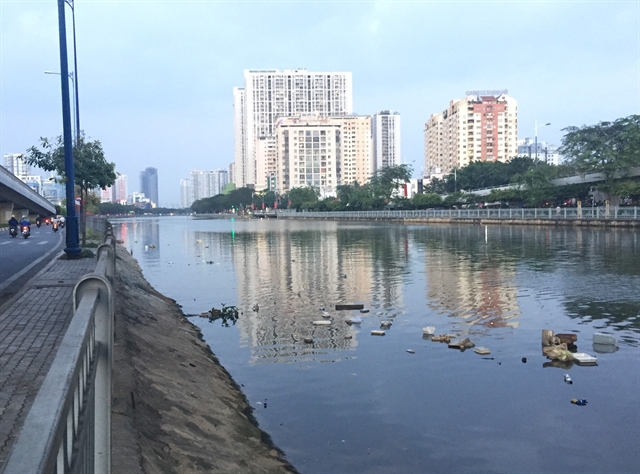 Society
Society


|
| Garbage is discharged directly into HCM City’s Tàu Hủ–Bến Nghé–Đôi–Tẻ canal basin. The third phase of the Water Environment Improvement Project in the basin, starting in 2022, is part of the city’s efforts to stem urban flooding. – VNS Photo Diệp Phan |
HCM City – To mitigate the impact of flooding caused by heavy rains and high river tides, HCM City has invested heavily in flood-prevention works, including drainage system improvement, dredging of canals and wastewater treatment systems.
Under a city plan, 80 per cent of the urban population is expected to have access to water drainage services by 2025, and the city will have over 80 per cent of its urban sewage water treated.
The city aims to have no flooding in the city centre of 106,41sq.km and solve flooding problems in remaining areas over the next five years.
The flood-prone Nguyễn Hữu Cảnh Street in Bình Thạnh District, for example, is being upgraded to prevent flooding, and pumps have been installed. The work is expected to be completed in April.
The city has been urged to improve the drainage capacity of southern city districts and build drainage systems in areas with none, especially in the east.
The municipal Department of Construction is working with the Department of Planning and Architecture, the Management Board Construction Investment Projects and related authorities to draw up an adjusted drainage master plan for the HCM City Zone to 2030 with a vision to 2050.
The department is also in charge of inspections and will ensure that investors install water drainage systems at their projects.
The city needs up to VNĐ107.2 trillion (US$4.6 billion) for flood-prevention projects by 2025, including 115 projects to improve water drainage systems and seven regulating lakes, officials have said.
Drainage projects will use official development assistance (ODA) and private capital from public-private partnerships.
Projects to handle tidal floods and lessen climate change consequences will be given priority.
Over the long term, the city will allocate capital from the State budget to urgent small-scale projects and important construction works to improve drainage systems and prevent flooding.
Key projects to dredge canals and upgrade sewer systems will be funded by ODA. Private capital will be used for projects that solve both urban flooding and environmental pollution and help with urban embellishment.
A dredging and urban renewal project in Xuyên Tâm Canal through Bình Thạnh and Gò Vấp districts and a water drainage and pollution reduction project in the Tham Lương–Bến Cát–Nước Lên canal basin will kick off this year. The two projects are scheduled to be completed in 2025.
The Water Environment Improvement Project in the Tàu Hủ–Bến Nghé–Đôi–Tẻ canal basin will start its third phase in 2022 and wrap up in 2027.
In the 2026-30 period, the city will have seven more sewage treatment plants, including the Nhiêu Lộc–Thị Nghè, Tây Sài Gòn, Bắc Sài Gòn 1, Bắc Sài Gòn 2, Cầu Dừa, Tây Bắc, Suối Nhum plants.
When these new plants start operating, the city’s treatment rate is expected to reach 88.3 per cent.
Climate-adaptation plans
Because of high tides in the Sài Gòn and Đồng Nai rivers, heavy rains and land subsidence, HCM City is included on a list of 10 cities worldwide that are most vulnerable to sea-level rise.
According to the Ministry of Natural Resources and Environment, the city’s rivers could rise by about 30cm by 2050 and 75cm by the end of the 21st century.
By 2050 the number of communes and wards affected by tidal flooding would rise to 177, equivalent to 61 per cent of the city's total area.
With such serious consequences, HCM City needs to make plans to adapt to climate change, Dr Hồ Long Phi, the director of the Water Management and Climate Change Centre under the National University–HCM City, has said.
The city has been encouraged to ensure space for water in urban areas and strengthen flood resilience through regulating lakes.
Phi said that flood-prevention works such as new dykes and drainage culverts, street upgrades, and pumping water would not be effective in the long run.
The city People's Committee has noted that it is impossible to completely control flooding, so sustainable, eco-friendly and economical flood-control strategies are needed.
Flooding risks in HCM City may grow 10 times more intense by 2050, given the current prevalence of poorly regulated construction projects and economic activities, according to a study by the international consulting firm McKinsey in 2020.
According to the findings, the city may lose billions of US dollars to sea-level rise, and a majority of its area may become vulnerable to extreme weather events if there are no serious climate-adaptation efforts and systemic reform of urban planning. – VNS